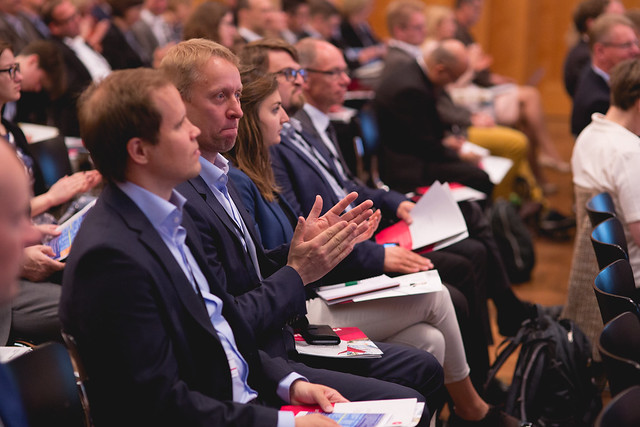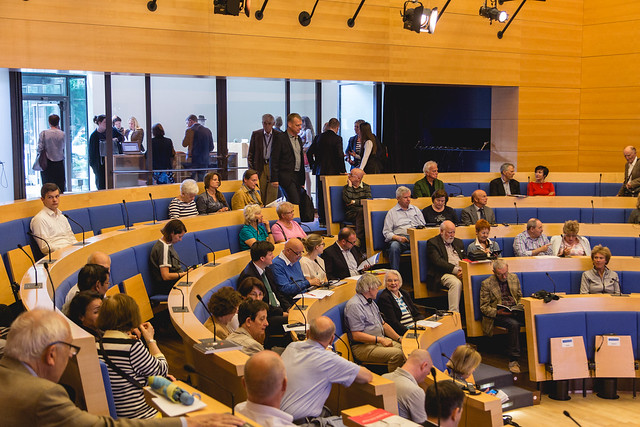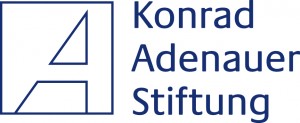This year, the 19th Baltic Development Forum Summit challenges old truths and takes a look at how a changing world creates new perspectives on growth. In what ways can an increased focus on sustainability and social engagement provide profits for business? How can the digital transformation open up new opportunities for small and medium size companies around the region? What will the political and economic developments within and outside the region mean for regional cooperation and our future economic performance? Together we will chart a new way for how to grow our region.
Organised by the Baltic Development Forum, the annual Summits have provided a high-level meeting place for regional cross-sectoral dialogue since 1999. See the full list of previous BDF Summits and related materials.
The 19th BDF Summit is arranged in conjunction with the 8th Annual Forum of the EU Strategy for the Baltic Sea Region.
Programme
08.30 Registration
09.15 Welcome
Lene Espersen, Chairman, Baltic Development Forum
09.25 New business models for sustainability
Sustainability rests on three pillars: Social, economic, and environmental sustainability. This is true for overall societal development, but also for business operations. More and more companies are realizing that environmental wins can have positive financial impact, and serve as a tool for reducing both economic and social risk. At the same time, the sharing economy and circular business models are allowing others to explore new ways of operating profitable businesses that meet current demand while also serving as good neighbors and community members, locally and globally. In this session we will explore new and smart business models for sustainability, from the perspective of companies operating in the Baltic Sea Region.
Speakers:
Dr. Florian Lüdeke-Freund, Senior Research Associate, University of Hamburg
Anders Lendager, Founder, Lendager Group
Mari-Ann Meigo, Co-founder & CEO, Gelatex
Moderator:
Lovisa Selander, Head of Sustainability and Communications, Baltic Development Forum
10.15 Connecting digital start-up ecosystems in the Baltic Sea Region
The Baltic Sea Region is a digital frontrunner, and home to countries that are among the most advanced globally within digital competences, use of internet, e-government services etc. Many cities in the region display thriving digital start-up environments, fueled by talents/entrepreneurs, high innovation scores and creative ecosystems. But while vibrant startup scenes are growing in several cities, their focus of collaboration tend to be the global hotspots beyond the region. By increasing connections within the region, connecting start-up communities in neighboring countries and finding ways to complement each other, much potential could be released.
How can the cities in the Baltic Sea Region interact across borders to boost transnational digital collaboration and an integrated digital labor market? Can we integrate a digital market by connecting innovative start-up ecosystems? How should it be done in practice?
Introduction:
Joakim Wernberg, PhD Candidate, Lund University
Panelists:
Olle Zetterberg, CEO, Stockholm Business Region
Janko Milunovic, COO, Startupbootcamp, Berlin
Stephan Jacquemot, Head of Microsoft Startup Strategy Germany
Laila Gercane, Head of Department, Vidzeme Planning Region, Latvia
Moderator:
Torben Aaberg, Head of Public and Digital Affairs, Baltic Development Forum
11.15 Coffee break
11.35 Key Note
Romualdo Massa Bernucci, Deputy Director General, European Investment Bank
11.50 State of the Baltic Sea Region – Presentation of the Political State of the Region Report 2017
The last couple of years the issue of Russia-Western relations has been on the top of the political agenda. Now the Brexit-decision and the election of Donald Trump as president of Unites States raise the question of a broader West-West-divide. What will it mean to our region that UK is leaving the EU? Will it strengthen or weaken the cooperation between the North European countries, and what will it mean for growth and economy in the region. Will the change of administration in Washington lead to a new US-Russia understanding on international issues like Syria and Ukraine? And if so what would that mean to the Baltic States, the Nordics, Germany and Poland?
Speakers:
Dr. Jana Puglierin, Head of the Alfred von Oppenheim Center for European Policy Studies at DGAP
Dr. Agnieszka Lada, MPA, Head of the European Programme in the Institute of Public Affairs
Panelists:
Dr. Lykke Friis, Prorector for Education, University of Copenhagen
Andris Piebalgs, Leader of Unity Party Latvia, frm European Commissioner
Dr. Christian Ketels, Senior Research Fellow, Stockholm School of Economics, and Faculty Member, Harvard Business School
Moderator:
Per Carlsen, Senior Advisor, Baltic Development Forum
12.50 Closing Speech
Flemming Stender, Director, Baltic Development Forum
Photos from the Summit
Photos from the Welcome Event 12 June
BDF Sessions at the 8th Annual Forum of the EUSBSR
13 June
17.00 – 18.30 Climate Challenges for Energy Supply
Organisers: Council of the Baltic Sea States (HA Climate), Latvian Ministry of Economics (PA Energy), Swedish Civil Contingencies Agency (PA Secure), and Baltic Development Forum
The climate is changing, and critical infrastructure including power plants and electricity grids are particularly vulnerable in the Baltic Sea Region. Power blackouts severely affect people’s wellbeing and the economy, including the provision of vital services. This seminar aims to address key problems caused by climate change to energy supply and seeks answers to how climate resilient technology and improved interconnections ensure affordable and secure supply of carbon neutral energy to the Baltic Sea Region.
Krista Kampus, Head of Unit, CBSS Secretariat
Dzintars Kauliņš, Director of the Renewable Energy and Energy Efficiency Department of the Ministry of Economics of Latvia
Krzysztof Laskowski, Advisor on Climate, EURELECTRIC
Hilde Marit Kvile, Senior Advisor, Nordic Energy Research
Andreea Tanasa, Policy Officer, European Commission, DG ENERGY
Ida Kullgren, Risk Officer, Värmland County Administrative Board
14 June
10.45 – 12.15 Inclusive Digitalization (Part 1) – Tech StartUps and Digital Transformation in Rural Areas
Organisers: Nordic Council of Ministers, Nordregio, Baltic Development Forum
Digitalisation has been viewed as a solution that can turn around the trend of outmigration from smaller cities, towns and rural communities into larger city areas. However, globalisation, urbanisation and digitalisation affect different places, rural and urban, in different ways. The impact of digitalisation is often experienced by smaller towns and remote areas as the absence of banks and shops and with healthcare provision as a distant e-service. Recognizing both the opportunities and challenges of digitalization the seminar will discuss how to ensure an inclusive digitalization as a way to connect societies in the Baltic Sea Region.
Martin Andersson, Professor, Blekinge Institute of Technology and “Top of Digital Europe”
Lena Carlsson, Chief Digitalisation Officer, Swedish Agency for Economic and Regional Growth
Sylvia Brune, CEO and Founder, Ahoy
Jukka Teras, Senior Research Fellow, Nordregio
Nelli Mikkola, Research Fellow , Nordregio
Karoli Hindriks, Founder, Jobbatical
Alexandra Horn, Head of Projects, BVMW, Association for Small and Medium-sized Businesses
Johnny Högberg, CEO, Skellefteå Science City
Niclas Forsling, Policy Area Innovation, Nordic Council of Minsiters
13.45 – 15.15 Inclusive Digitalization (Part 2) – Connecting Digital Bioeconomy and Rural Development
Organisers: Nordic Council of Ministers (PAC bioeconomy/PAC Inno), Nordregio, Baltic Development Forum
What are the challenges and opportunities when ‘Digi meets Bio’? The session focuses on the digital disruptions of production and consumption in the food and forest industry. We will investigate existing examples and experiences, discus the impacts of emerging trends and explore the potentials of a digital bioeconomy in the light of the need for a sustainable transition of the ‘old’ bioeconomy industries.
Jaakko Kuusisaari, Director, Head of Wood and Fibre Solutions at Tieto
Hörður G. Kristinsson, Chief Science and Innovation Officer, Matis and chair of the Nordic Bioeconomy Panel
Business cases from Nordic and Baltic countries
Moderator: Maria Olofsson, Project Manager, Growth Incubator and Infotech Umeå, Business Coach
13.45 – 15.15 Looking Towards 2030: Preparing the Baltic Sea Region for the Future
Organisers: Swedish Agency for Economic and Regional Growth, CPMR Baltic Sea Commission, Baltic Development Forum
In an ever-changing world, what do we need to do to meet the challenges facing the Baltic Sea Region? This seminar addresses the issues facing the Baltic Sea Region in a “post-globalised” world of Brexit, Trump and slowing growth, sharing recommendations from a policy paper prepared for the occasion. The discussions will result in recommendations on areas of cooperation that need to be strengthened and how policy and implementation must and should be operationalised through concrete action.
Dr. Christian Ketels, Stockholm School of Economics
Dr. Kai Böhme, Director, Spatial Foresight
Mart Laanemäe, Ambassador of Estonia to Germany
Mattias Landgren, State Secretary, The Government of Sweden
Anke Spoorendonk, Minister for Justice, Culture and European Affairs of Schleswig-Holstein
Annika Annerby Jansson, Vice President of CPMR (Region Skåne)
Moderator: Thomas Winther, Founder, InnoGate
8th Annual Forum of the EUSBSR
The 8th Annual Forum of the EUSBSR will be hosted by the Federal Foreign Office together with the Baltic Sea Commission and in close cooperation with the European Commission on 13 – 14 June 2017 in Berlin. About 800 participants from governments, international organisations, NGOs, universities, local and regional administrations and business will discuss a broad range of issues relevant for the Baltic Sea Region. The motto of the 8th Annual Forum is “connectivity”, highlighting the necessity to further intensify contacts throughout the whole Baltic Sea Region and to develop a better awareness of each other’s perspectives. Visit the website
Venue
Federal Foreign Office
Entrance: Unterwasserstrasse 10
10117 Berlin, Germany




